When it comes to knowing which solar panel brands are the best, there’s nobody better to ask than the people who install them for a living, which is exactly what we do each year. It’s time to reveal the 2025 SolarQuotes Installers’ Choice Awards for Best Solar Panels.
We Did Things Differently This Year
In previous years, we asked installers in our network three questions:
- What brands would you install on your home if you were on a budget?
- What if money was no object?
- What brands have the best warranty support?
This year, to make it easier for our busy installers to give feedback, we only asked one question:
If installing a system on your own house today, what brands would you use?
In total, 161 installers replied to our survey. Here are the results, with a first-time entrant as the surprise winner:
Best Solar Panels In Australia: 2025
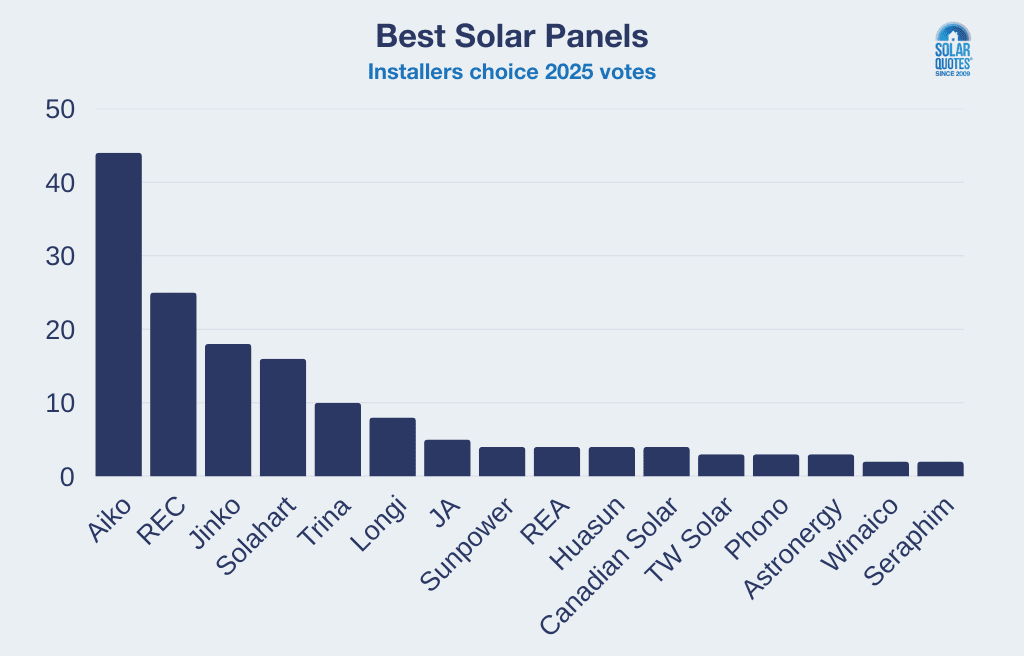
Best Solar Panels 2025: First Place – Aiko Solar
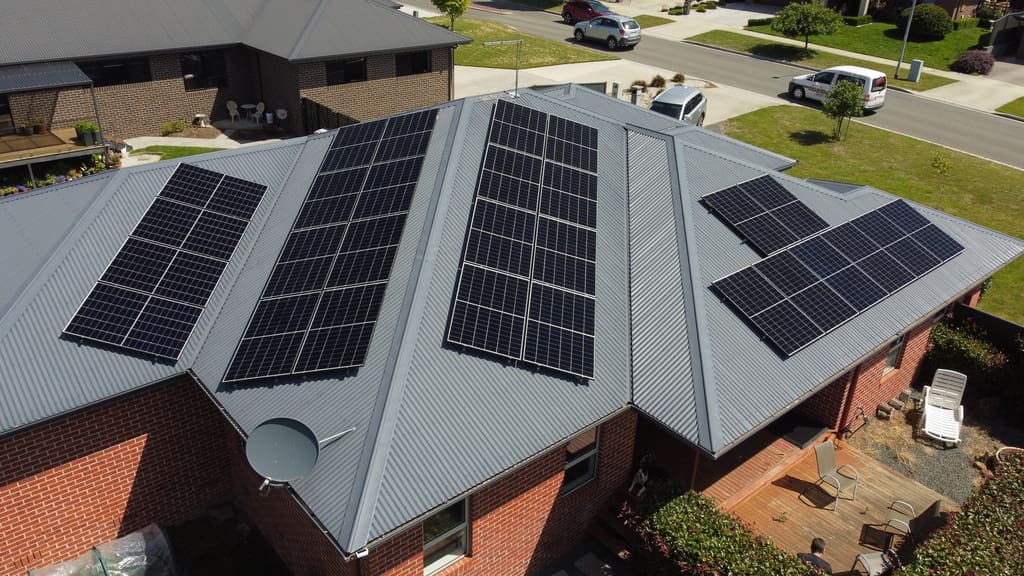
An Aiko solar array, installed by Genr8.
Only launching in Australia in March 2024, Aiko has made a strong impression on installers and homeowners alike, thanks to some slick marketing and competitive pricing.
They’re the clear winner in this year’s voting, with 27% of the vote (compared to 16% for the runner-up, REC).
Their residential offering is the Neostar range of panels, which all carry a 25-year product warranty, and have performance specs on par with (or exceeding) premium offerings such as Sunpower and REC.
For example, their 455W Neostar 2S panel has an efficiency of 22.8%, compared to 22.6% for REC’s Alpha Pure RX – for half the price.
Aiko actively replies to customer reviews on its SolarQuotes review page, which is a good sign it takes customer service and support seriously.
Anecdotally, Aiko appears to have captured a large amount of market share from competitors, as it’s one of the most common panel brands we see on quotes homeowners ask us to review.
Regarding their slick marketing, especially around their shade performance, longstanding SolarQuotes client MC Electrical did a YouTube breakdown of Aiko’s claims.

Taken from the Aiko Neostar 2S datasheet, Aiko’s marketing department couldn’t clearly explain to us what this means in terms of real-world performance.
Best Solar Panels 2025: Second Place – REC
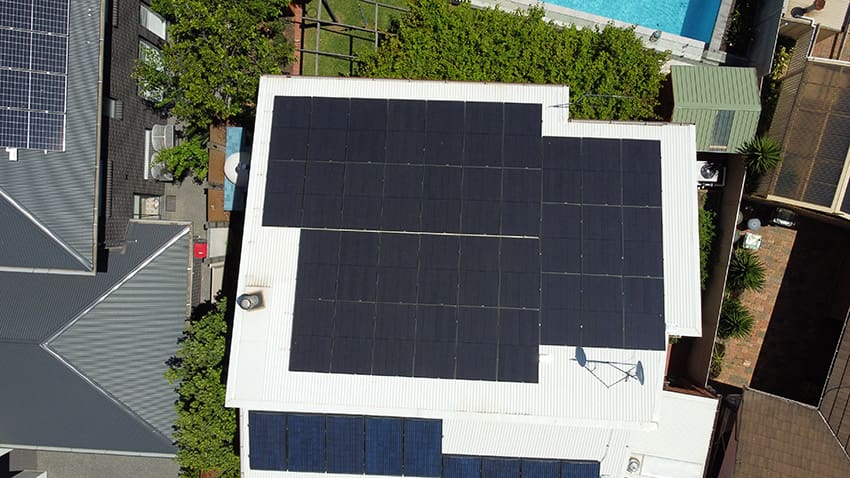
14 kW of REC Alpha panels on my north-facing roof
Dropping to second place from last year’s first, REC secures silver with 16% of the vote.
Known as a premium-end panel manufacturer with a price point to match, their flagship product line is their “Alpha” series of panels, with the latest and greatest being the Alpha Pure RX, which clocks in at 470 watts.
They also offer the 415-watt TwinPeak 5’s as a more budget-friendly option.
All REC panels come with a full 25-year product warranty.
One installer, who didn’t even vote for REC, conceded that they believed they’re the best choice for coastal conditions, telling us: “REC for sure if I was waterfront.”
Best Solar Panels 2025: Third Place – Jinko Solar
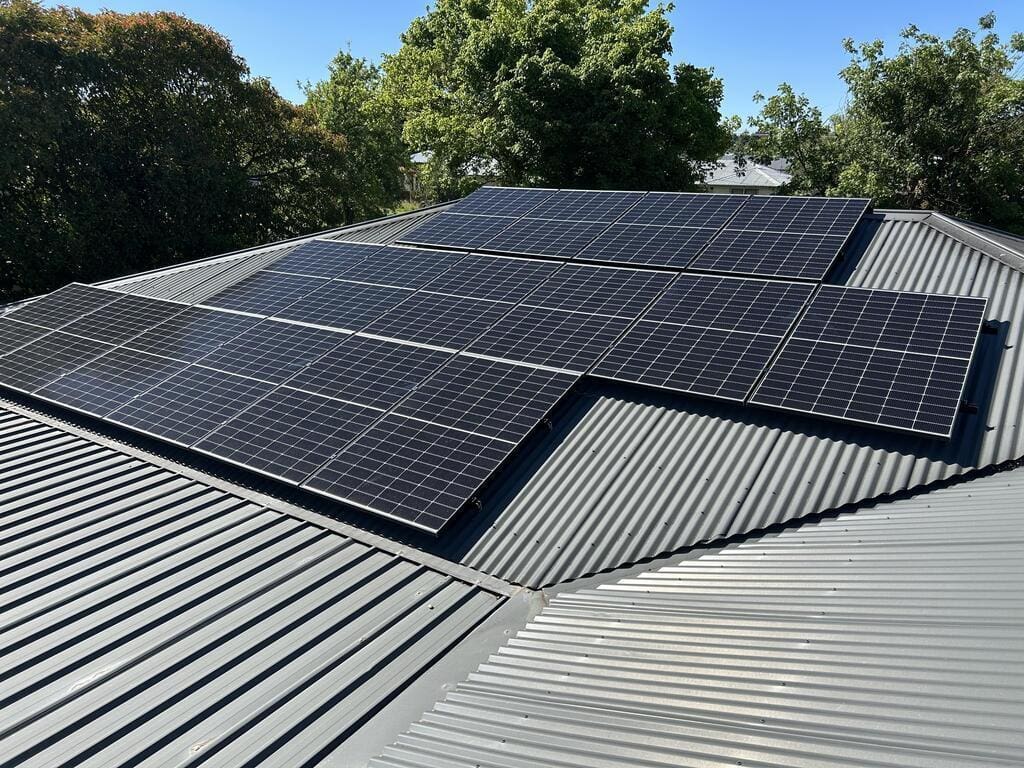
Jinko panels, installed by Freedom Energy Solutions Group
Taking bronze with 11% of the vote, Jinko Solar is a titan of the solar industry with a long history in Australia.
Like Aiko, they make value-for-money panels, with performance only marginally lower than higher-priced alternatives.
Their flagship Tiger Neo range of panels comes with a full 25-year product warranty.
What can you expect to pay for systems using these brands?
Awards are a nice vote of confidence, but what’s the hit to your wallet if you want to use these brands?
Pricing at the panel level can be seen on my solar panel comparison table.
Flagship panel pricing:
- Aiko Neostar 2S 455W: $160/panel, or $0.35/watt
- Jinko Tiger Neo 440W: $125/panel, or $0.30/watt
- REC Alpha Pure RX 470W: $290/panel, or $0.61/watt
To use an example, I’d expect a 10kW solar system installed on a straightforward roof in a major metro area, with a premium string inverter (like Fronius), to cost roughly:
- Aiko: $9,000-$11,000
- REC: $12,000-$14,000
- Jinko: $9,000-$11,000
Which installers use the winning panels?
Congratulations to this year’s winners – but especially Aiko for such a convincing win as a newcomer.
If you want to compare the specs of the winners and many other brands, check out our solar panel comparison table.
If you’re looking to get quotes for solar from installers who sell the winning brands, visit my cities list, choose your city, and use the filters to select only the brands you want:
Then, select up to three installers, and hit ‘Get quotes from selected companies’.
Congratulations again to this year’s winner Aiko. According to Australian solar installers, they are the best solar panels in Australia.

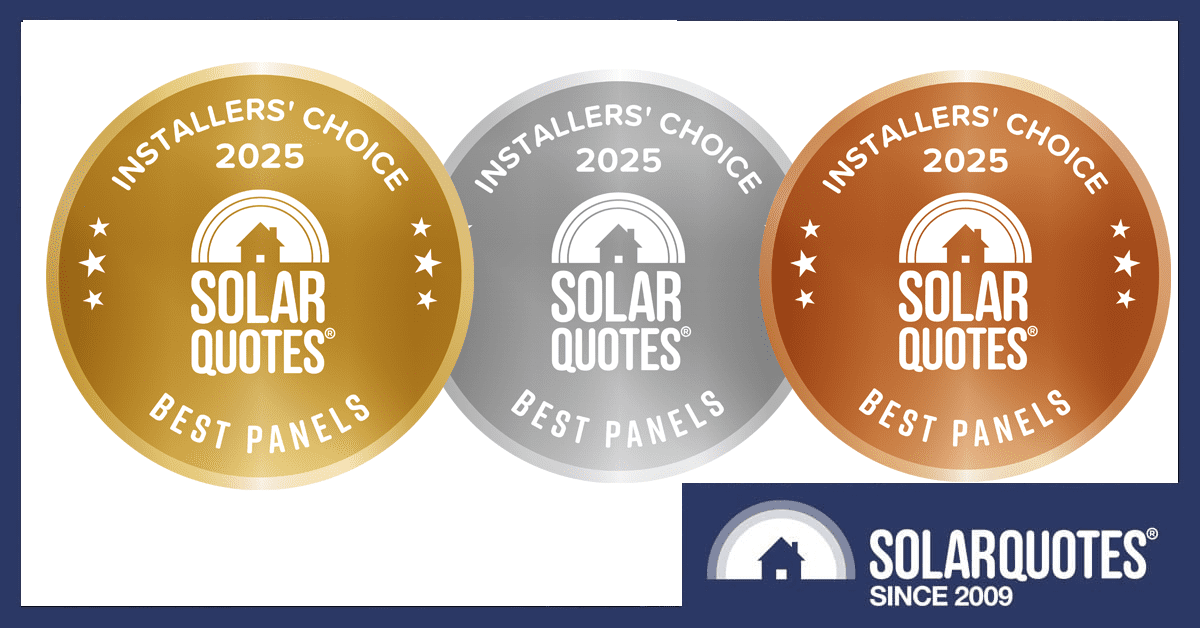
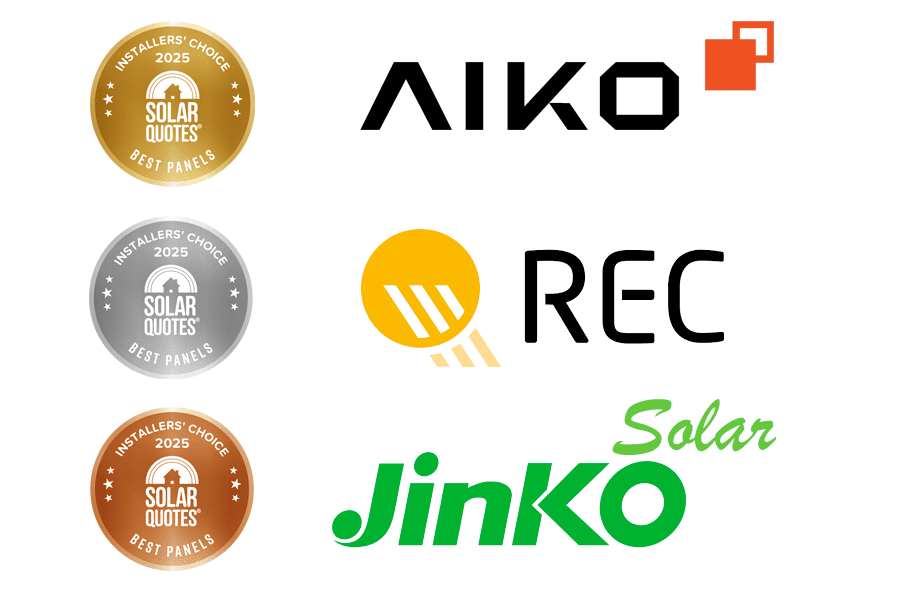
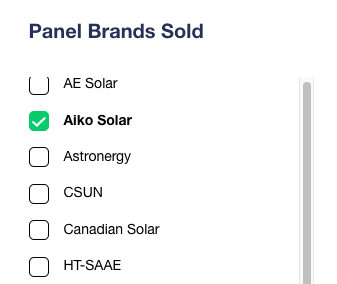
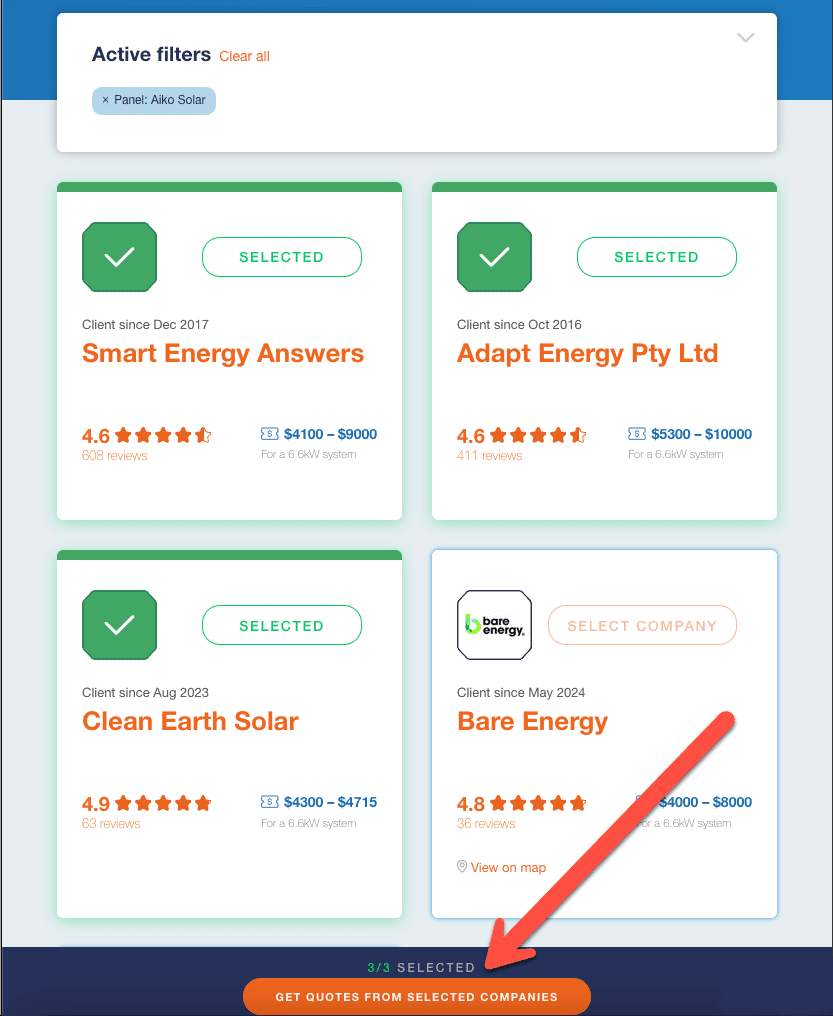
 RSS - Posts
RSS - Posts



Looking at the solar comparison guide, Canadian Solar looks like it is a better buy than Aiko. How are they so far apart in the voting results?
As someone in the top-end of town I am about to complete an Enphase installation. Just wondering if the installers preference varies with amount of panel shading expected?
Asking installers which panels are best is like asking Doctors which drugs are best. Obviously, it’s the one that gives you the best kickbacks, right?
I get your point. Hs Aiko, the new comer, been providing big incentives??
FYI Doctors don’t get kickbacks. It’s the pharmacists that have the true conflict of interest…
That’s a cynical take, and to be honest, it’s way off the mark. There’s no room for the kind of “kickbacks” you’re talking about. When wholesaling solar panels in Australia, margins are razor-thin—around 3%—so there’s just no money in dodgy deals.
What good installers really care about is support and reliability. Why? Because under Australian Consumer Law, they’re responsible if something goes wrong over the next 25 years. They’re not picking panels to make a quick buck; they’re picking the ones they know will last, so they’re not constantly chasing warranty issues and letting their customers down.
Implying this poll—and the installers who took part—are corrupt is not only unfair, but it’s also a slap in the face to the hardworking, ethical people who’ve built their businesses on doing the right thing. Sure, every industry has a few bad eggs, but most of the small and medium installers we work with are out there doing honest work, trying to give people a good solar system that lasts the distance.
Well said Finn I fully concur with your reply to cynical comments. The majority of small businesses are in the market to offer products and services to consumers to make a fair living and not to ‘squeeze’ as much profit as possible by using ‘dodgy’ practices.
I have found your site very useful in securing quotes for solar panels and a battery system and also for the reviews of different components. Thank you.
Do Tindo panels not get a mention because not many people install them?
We bought them because they made in Australia.
Tindo are good panels, but Tindo have historically made them really hard for installers to get hold of, preferring to install them via their own retail arm. They are also very expensive!
Hi
I’m about to install Suntech panels. Not sure now. Didn’t crack it for a mention. Any feedback?
I wonder whether these price ranges are after or before solar rebates?
To use an example, I’d expect a 10kW solar system installed on a straightforward roof in a major metro area, with a premium string inverter (like Fronius), to cost roughly:
Aiko: $9,000-$11,000
REC: $12,000-$14,000
Jinko: $9,000-$11,000
Definitely after. I’m not sure what companies you’ve been dealing with, but no company that cares about install quality and a good after sales experience would be able to them cheaper than that post rebate.
Thank you Jack!
Wondering why one installer believes REC panels are “the best choice for coastal conditions, saying “REC for sure if I was waterfront.” The REC installation manual says they should not be installed “where the panels are exposed to direct contact with salt water/spray”. Maybe they all say that. So without doubting the wisdom of the installer, what makes the REC panels the better choice? I’m about to install on a cliff about 50m from the sea.
Interesting Aiko came in number one. Looking at MC electrical they were very negative about the shading claims. Why would people want a panel that does not stand up to claim and has not been around very long. Looking at MC other video’s they recommend Canadian as value for money with the new gen Fronius. Its a lot of fun to see what others are using . Keep up the great work , we are about to get our second lot of solar from your recommendations
Elmer
Hi
I’m considering installing CANADIAN panels and FOXESS inverter
I thought that CANADIAN brand was a leading Co. but it looks a bit in the middle.
Can someone comment on the brands, please? are they any good?
Hi Elmer,
I’ve installed thousands of Canadians, they’re much like any other chinese panel, good value for money but nothing to write home about.
Foxess are cheap in my opinion. Of the established brands I would use Solis if the budget is tight, GoodWe are good, Sungrow are fine, and Fronius are what’s on my own place.